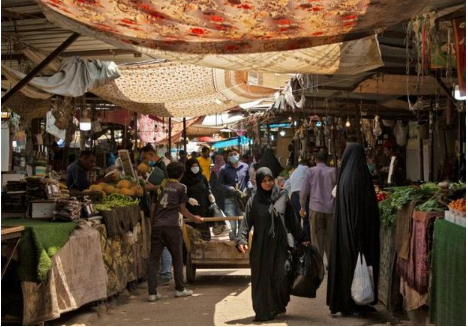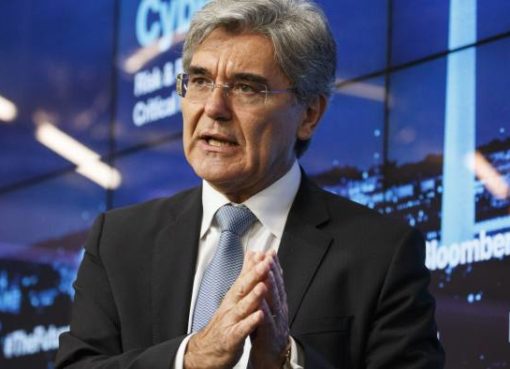While violence has taken Iraq’s northern oil sector almost entirely offline, growing production and export capacity in the south is keeping Iraq afloat.
RUMAILA – Iraq is on track for a strong month of oil sales, as southern fields increase output into revamped export infrastructure.
The success of the southern oil sector to date has been essential, partly compensating for the loss of nearly all Iraqi production and refining capacity north of Baghdad, following a massive insurgent offensive led by the Islamic State of Iraq and al-Sham (ISIS). Making good on growth plans will be equally as important.
“Currently our output is estimated at 3.15 million barrels per day (bpd) and our export rate stands at more than 2.6 million bpd,” said Oil Minister Abdul Karim Luaibi, speaking at the Rumaila oil field on Wednesday. “A few days ago, we had the highest rate of export of 2.95 million barrels.”
The recent production and export gains come after a difficult month of June, when exports dropped to 2.423 million barrels per day (bpd), down from 2.58 million bpd in May – a decrease largely due to poor loading management, scheduled maintenance at the al-Basra Oil Terminal (ABOT), and a minor accident at one of the single point mooring (SPM) buoys. In June Iraq produced an average 3.12 million bpd, according to energy information firm Platts.
The violence that has plagued northern Iraq has not directly affected the oil-rich south. Sunni militants led by ISIS have taken the country’s northern oil sector almost completely offline, but they have had a difficult time penetrating Basra, although there have been occasional bombings.
“Output has not been affected by recent events,” Luaibi said.
While it is true that Iraq’s overall production has not fallen drastically as a result of the violence, the country would likely be selling far more oil without the recent deterioration in security.
Iraq set an export record in February, of 2.799 million bpd, including nearly 300,000 bpd flowing through the Iraq-Turkey Pipeline (ITP). Those record exports has not been matched since then, largely because the ITP – which runs through territory controlled by anti-government militants – has been shut off since March 2.
Iraq’s ability to expand its southern production and export capacity has nearly compensated for the loss of its northern oil sector. The downstream aspects of the country’s oil sector, however, have been more severely disrupted by the recent violence.
Before ISIS’s June offensive, domestic crude consumption in refineries and power plants was between 700,000 and 900,000 bpd. But now the 310,000 bpd capacity Baiji refinery is offline, as are smaller refineries and fields in Anbar and much of Kirkuk, Ninewa, Diyala and Salahaddin. Pipelines are no longer able to carry oil from northern fields to the Baghdad refinery of Dora, which has suppressed oil production and refining capabilities.
Relying on the south
The decrease of northern production and domestic refining means Iraq is depending more than ever on the southern oil sector.
Much of Iraq’s production is coming from the Rumaila oil field, which is ramping back up to a 1.4 million bpd target. The field has produced more than 2 billion barrels since BP signed a contract to take over as operator in 2009 – a milestone that the Oil Ministry marked with a ceremony on Wednesday.
Like many fields, Rumaila has often been forced to curtail production because Iraq has struggled to complete projects to expand storage and export capacity, which has been insufficient to handle rising production capacity. The problems have been especially acute when tanker ships have been prevented from loading by bad weather.
Now that the worst infrastructure constraints appear to be easing, Iraq is poised to improve upon its June production dramatically. Mid-month loading averages are at 2.729 million bpd, according to Platts. Lloyds List Intelligence Tanker Analysts have reported during that time frame that tankers have been able to load without major interruption at ABOT, the Khor al-Amaya oil terminal, and the SPMs, with a consistent dozen or more tankers waiting at the anchorage.
“The output this month reached unprecedented levels and we are looking forward to increasing exports rate in all fields, including Rumaila and West Qurna 1 and 2, Zubair and new projects as Halfaya, from which we are looking to achieve approximately 100,000 bpd,” Luaibi said. “Also the field of Badra, which has started pilot production, and inshallah in the coming days, we will see commercial production started from this field.”
Basra fields include West Qurna 1, operated by ExxonMobil; West Qurna 2, by Lukoil; Zubair, by Eni. Halfaya in Missan province is operated by CNPC, and Badra, in Wasit province, by GazpromNeft. Combined with Royal Dutch Shell’s Majnoon field in Basra, CNOOC’s trio of fields in Missan, and the Dhi Qar field of Garraf operated by Petronas, they are producing at least 2.8 million bpd, according to an Iraq Oil Report study.
This production feeds not only the Basra Gulf export infrastructure but also the Basra refinery, which is called Shuaiba, and has 210,000 bpd capacity, as well as the 30,000 bpd refineries in Missan and Dhi Qar provinces.
“The Shuaiba refinery is producing today 8,300 cubic meters of gasoline per day, 1,200 cubic meters of kerosene, 2,360 cubic meters of diesel, 4,700 cubic meters of fuel oil and 250 tons of liquid gas,” said Abdul Hussein Nasser, the director general of the South Refineries Company. “The refinery is operating at 100 percent of its design capacity.”
Drones to keep watch
Maintaining momentum of oil operations in the south depends on keeping the fields and workers safe.
Though ISIS-led militants have perpetrated fewer attacks in the south of Iraq than middle and north of the country – and none have reached the oil fields – there is mounting concern about keeping people and assets safe.
Numerous companies have reduced staff to essential personnel only and increased the level of private security companies.
“The oil companies are well secured since they are protected by professional security companies that are considered in the plan of the operation leadership,” said Abbas al-Haidari, the deputy mayor of the town of Zubair.
IOCs have worried that the most qualified security forces that had been stationed in the south have now moved north to fight ISIS, leaving less capable units – both militia forces and inexperienced, unprofessional or inadequately trained government forces – to fill the gaps.
“There is a special attention for such border areas as Safwan, Um Qasr and Zubair particularly with the withdrawal of the border guard forces to take part in the fighting [in northern Iraq],” said a senior official at the Basra Operations Command. “We spread checkpoints along Safwan and along the highway to Rumaila. We also enhanced intelligence effort.”
“In the past few weeks, we have taken several measures in coordination with law enforcement services in the province to enhance security measures at all sites and increase confidence in companies operating in Basra,” Luaibi said.
This includes four unarmed drones that BP has for more than a year attempted to get into the country, though bureaucratic red tape, particularly at Iraqi Customs, has been a problem, a senior private security company official who works with multiple IOCs said.
“All suspended issues between the company and the Iraqi authorities regarding using [the surveillance drones] have been resolved,” said a senior Iraqi official at Rumaila. “A team of control officers of the Iraqi Air Force has been sent to train in the United States. According to the deal, the whole supervising team should be Iraqi.”
A security official familiar with the initiative confirmed the surveillance drone deal, but said the control officers to be trained are being drawn from the Iraqi Army.
It’s unclear where the drones will operate, with the Rumaila official saying it would be used only in the vicinity of the Rumaila oil field and other places where BP would operate.
Luaibi, however, said, “They will provide important information in all areas of Basra.”
“Drones have been introduced to monitor our projects and our companies and our oil fields,” Luaibi said. “This is an achievement the company BP can be credited for.”
Regardless of whether the drones merely give Rumaila a better view of oncoming trouble or whether they are used as a tool for proactive measures by Basra security forces, there remain some important issues that could impact successful operation, the senior private security official said.
“BP does not have a capability to respond to any targets, and they can only send data” to Iraqi security forces responsible for the province, the official said. Similarly, “if a drone spotted a group of armed men with a salvo of rockets, what could they do about it? It would be too little too late.”
And if they did get eyes on nefarious activity in time, Iraqi authorities would need to be able to send a qualified response team – by air or ground – in time to make use of the drone intelligence for a quick enough response.
The official said that drones for such use come in packs of four. “This gives 24-7 coverage with one spare and one in maintenance,” the official said.
The package costs about $24 million per year to implement, assuming expat pilots are used, he said.
Without an ability to “exploit the data” of the drones, the official said, they are solely useful to giving any one relying on them a bit more advance warning in case of danger.
This highlights the importance of making sure security forces on the ground are up to the task.
Basra Governor Majid Nasrawi said a new regimental team of 250 police will be based at Fao, which is near the borders of both Iran and Kuwait, and where the storage and pumps are to send all crude exports to the Iraqi terminals in the Basra Gulf. A Basra Province Police official said it will be “made up of those who volunteered following a fatwa issued by Sayyed Sistani.”
Security forces have increased around the Basra Sunni enclave in the town of Zubair, which has seen no reported issues since the ISIS-led offensive began on June 9.
Zubair council member Waleed al-Edani said there is concern about alleged massing of insurgent groups in the Saudi Arabian border town of Hafar al-Batin, but that “Zubair has a large area and heterogeneous religious sects as well as many oil projects. Therefore we formed a security cell to accurately follow up with security. And by recruiting more than 2,000 volunteers we managed to form guard squads.”
Luaibi, too, appeared unconcerned with violence in the north running down into Basra.
“Our investment projects are progressing nonstop and definitely would not be affected by current events,” he said. “Projects represented by contracting companies or our national companies are ongoing to increase output and we do not have any problems.”
It remains to be seen, however, how Iraq’s growing civil conflict will affect oil companies as they make longer-term decisions about whether – and how aggressively – to continue investing in their projects in southern Iraq.
Iraq Oil Report, published Sunday, July 20th, 2014
Ali Abu Iraq reported from Rumaila. Kamaran al-Najar reported from Kirkuk. Ben Lando reported from the U.S. Iraqi staff reporting from Baghdad are anonymous for their security.








Comment here